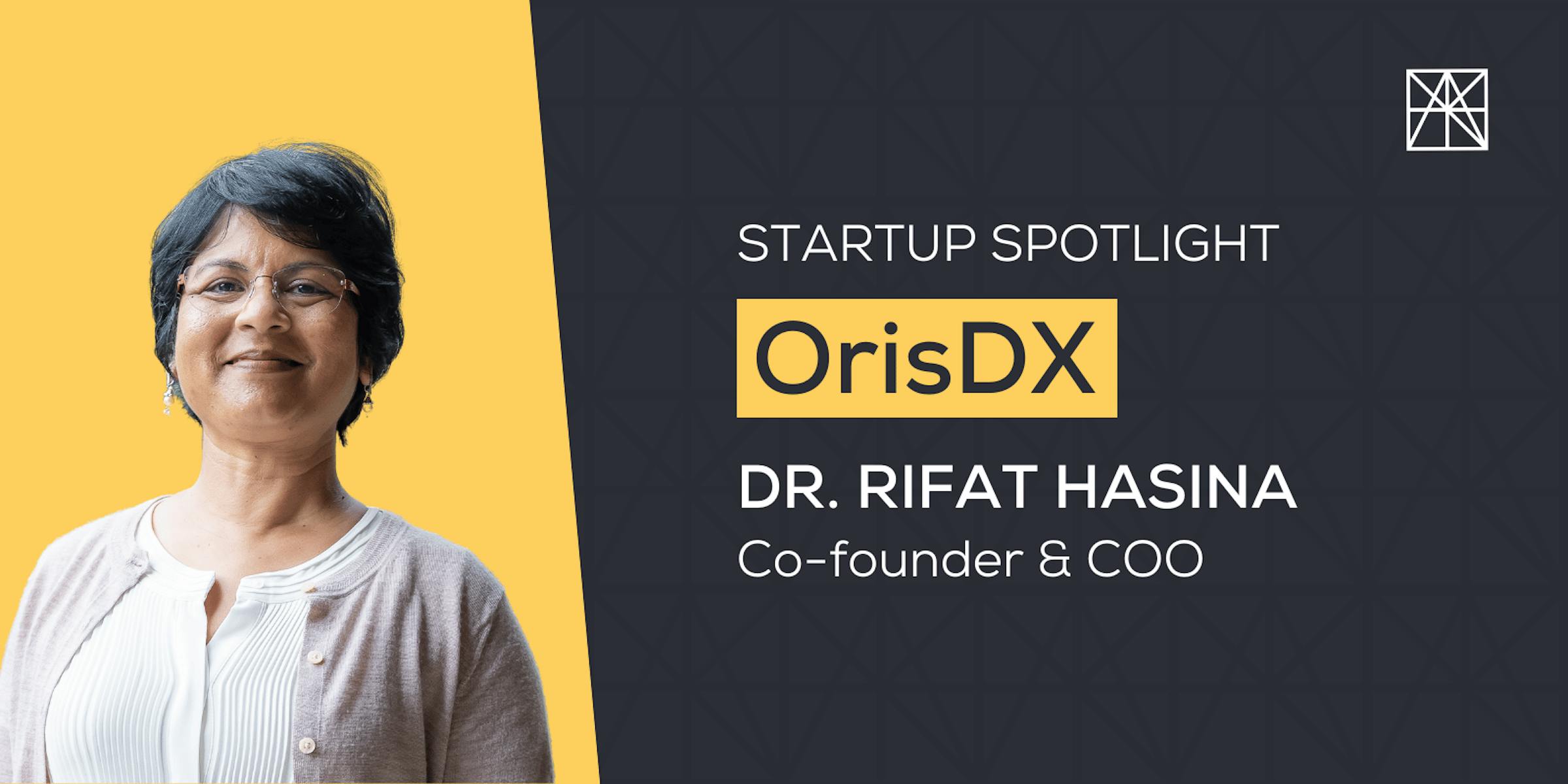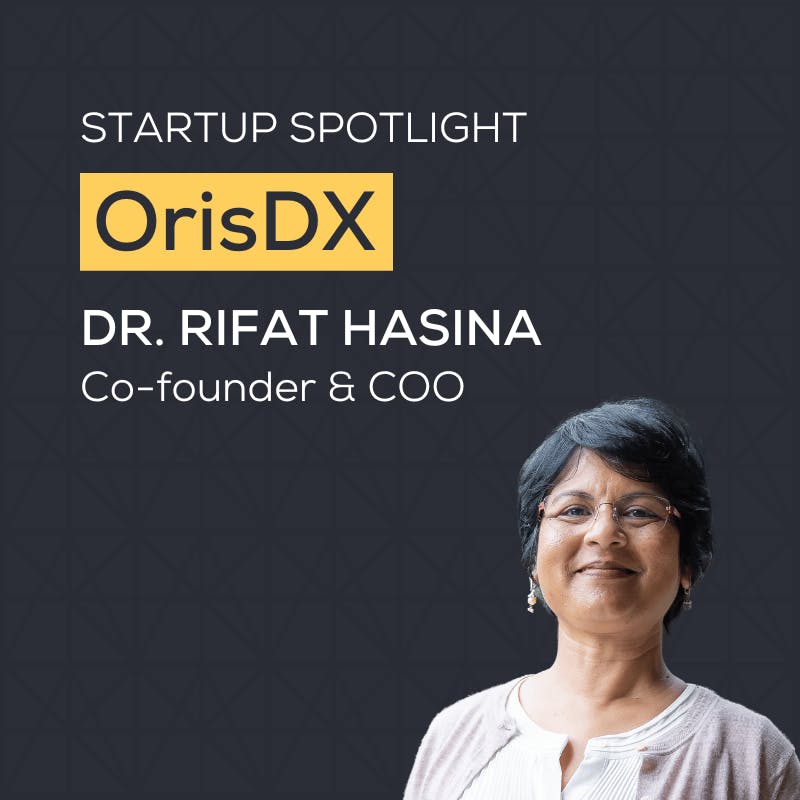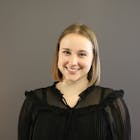MATTER startup spotlight: OrisDX
Enabling early detection of oral cancer
According to the Oral Cancer Foundation, more than 450,000 people are diagnosed with oral or oropharyngeal cancer globally each year. It’s also reported that when detected early, people have a more than 60 percent increase in chance of survival.
MATTER member OrisDX has developed a non-invasive, saliva-based test to detect oral cancer early. Read on to hear from Dr. Rifat Hasina, co-founder and chief operating officer of OrisDX, about the OrisDX test, their company and how their participation in the inaugural cohort of SMILE Health in 2022 helped move their business forward.
Responses have been edited for length and clarity.
MATTER: Tell me about the OrisDX solution.
Hasina: The OrisDX diagnostic aid is a tool that will help in early detection of oral cancer, which is important because with early detection, the survival rate increases from 25-40 percent to 80-100 percent. Our solution is a non-invasive, biomarker- and mutation-based test that dentists and primary care providers can use to test a salivary rinse from a patient’s mouth to detect oral cancer. The test has a 93 percent sensitivity rate and near 100 percent specificity rate, which means it is highly accurate.
MATTER: What makes the OrisDX test different from others tests on the market?
Hasina: At the moment, there aren’t any adjunct tests on the market approved by the American Dental Association, and the current standard of how to detect oral cancers is by visual and tactile examination. If you go to the dentist, they’ll use a light and mirror to look all over your mouth to see if there’s any abnormality. This works, but many times it doesn’t and it fails patients, providers and payers. It’s difficult even for a specialist to find cancer unless there is an overt lesion, but at that point, it’s often too late. There are also some light-based and brush tests, but none of them have been clinically proven to be effective.
Additionally, the way to confirm if a lesion is cancerous is by incisional biopsy where a piece of a patient’s mouth would have to be cut out before one can tell whether it’s cancer or not. Our test is non-invasive, so all a patient has to do is rinse and spit in a cup, making it easy for the dentist to provide the test and triage patients, reducing unnecessary biopsies.
MATTER: What milestones have you reached so far?
Hasina: OrisDX was incorporated a year ago in April 2022. Once we developed the test in the lab and decided to commercialize it ourselves, we filed patents and established the company. After participating in several accelerator programs at the Polsky Center at the University of Chicago, we went on to win the Edward L. Kaplan, ’71 New Venture Challenge in June 2022 and also won the George Shultz Innovation Fund Challenge, together raising close to a million dollars and giving us the funds to move forward.
We were part of the inaugural cohort of the SMILE Health incubator organized by CareQuest Innovation Partners and MATTER, through which we partnered with Colgate, DentaQuest and Cigna to validate what patients and dentists want, the market need for our test and how it would add value for payers.
I also won the Women in Bio Chicago Start-up Challenge 8.0 in fall of 2022, leading to wider recognition and many more connections for OrisDX.
We’ve recently hired our first full-time employee, Patrick Conniff, MBA, the chief commercial officer for OrisDX. Patrick has been instrumental in OrisDX’s progress to date and is helping accelerate and expand our bandwidth to achieve our goals. We are currently developing the OrisDX go-to-market and regulatory strategies in preparation for clinical studies leading to FDA approval.
MATTER: What’s the OrisDX story? How did you and your co-founders come up with the idea and decide to bring it to fruition?
Hasina: OrisDX is the brainchild of one of our five co-founders, Dr. Nishant Agrawal. He’s an ear, nose and throat surgeon and oncologist and has been researching the mutational landscape of oral cancer and the use of saliva as a liquid biopsy for years. I have a long history of conducting head and neck cancer research and joined Nishant’s team seven years ago and with him, wrote a grant to study the use of biomarkers in saliva to accurately detect cancers of the oral cavity.
This led to a study that we conducted in India, which we chose to run in Southeast Asia because of its high incidences of oral cancers due to the habitual chewing of betel nut and tobacco. The study showed positive results, and in the fall of 2019, we partnered with Booth’s Global Social Impact Practicum to conduct a market assessment study to see if the test would be a feasible commercial product.
Our other co-founders are Dr. Chetan Bettegowda, a neurosurgeon and liquid biopsy expert, and Dr. Evgeny Izumchenko, a premier geneticist, both of whom worked with Nishant for over a decade to develop the science and methodologies behind our test.
When COVID hit, we were at a standstill for a few months, trying to figure out if and how we should continue on our path to commercialization. Eventually, we decided that we wanted to move this forward in the U.S. because if it’s successful there, we could take it global to reach the populations with higher rates of oral cancer. As we moved through Polsky accelerators, we connected with then Booth MBA student Jake Stangl who became one of our co-founders and chief business officer. Around that time, Patrick Conniff also lent hands helping drive the business forward.
MATTER: What is your background, and how did it prepare you for this venture?
Hasina: I went to dental school in Bangladesh and saw a staggering number of people with head and neck cancer, which served as an inspiration for my research career. I then went to Japan to get a PhD in oral and maxillofacial surgery, beginning a career in basic and translational cancer research on head and neck cancers.
I’ve been at the University of Chicago for 21 years, with many years of fulfilling my passion of doing hands-on research in the lab. Since I joined Nishant’s lab in 2016, I’ve taken on more research and project management responsibilities, broadly helping advance the field of head and neck cancer research.
It was during this phase of my career that our team developed this test in the lab and decided to take it to market. Overnight, I had to become an entrepreneur, which has been a big but exciting change for me since I’ve spent my entire life in academia.
MATTER: What have you learned on your entrepreneurial transition that you would share with entrepreneurs just starting out?
Hasina: I’ve learned that having a great idea, a great product and a passionate team is very important. We’ve faced some obstacles, but our strong mission inspires me to keep going. You also have to know your village and be able to reach out to and count on them.
We are also fortunate that we are at the University of Chicago and surrounded by opportunities to develop our ideas and product. If not for Booth and the Polsky Center for Entrepreneurship and Innovation, I don’t think we would have advanced our business as far as we have over the last year.
MATTER: What value have you gained from MATTER and SMILE Health?
Hasina: The validation from people who saw what we’re made of and that they value us was really critical as it gave us confidence knowing that people believe in the team, the product and its commercial value and social impact.
In addition to the SMILE Health validation studies, we built many relationships within both MATTER and CareQuest — we feel like we’ve become part of the MATTER family. We also gained connections to investors, strategic partners and subject matter experts. The public presentation of our work through Demo Day opened the path to many more connections where people came up to us offering to help. Our work has been enriched, advanced and made easier as a result of the incubator, and we greatly appreciate that.
About MATTER
At MATTER, we believe collaboration is the best way to improve healthcare. The MATTER collaborative includes more than 800 current and alumni startups from around the world, working together with dozens of hospitals and health systems, universities and industry-leading companies to build the future of healthcare. Together we are accelerating innovation, advancing care and improving lives. For more information, visit matter.health and follow @MATTERhealth.
About OrisDX
OrisDX is a venture that has developed a novel salivary diagnostic aid utilizing non-invasive, molecular-based techniques to detect cancers of the oral cavity with very high accuracy. Rooted in top physicians’ and scientists’ ground-breaking research, the OrisDX test enables early detection of oral cancers to alleviate the global burden of head and neck cancers through greater access to diagnostics and screening.




